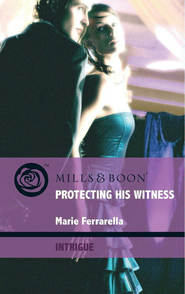По всем вопросам обращайтесь на: info@litportal.ru
(©) 2003-2024.
✖
Coming Home For Christmas
Автор
Год написания книги
2019
Настройки чтения
Размер шрифта
Высота строк
Поля
“People aren’t nearly as nice as you seem to think they are,” he told her.
“And,” Kenzie interjected, “they’re not nearly as evil, self-centered and hot-tempered as you seem to think they are.” The look she gave him said they were at a stalemate and for now, she was willing to let it go at that.
“Better safe than sorry,” he pointed out.
She pressed her lips together, aware that since he was the client and she was in essence working for him, she should just drop this.
And she did.
For about five seconds.
“Being safe is highly overrated,” she told him.
Kenzie paused for a moment, back to debating whether or not to reveal who she was. Initially, she’d decided not to mention it, but as things began to progress, she’d gotten more and more tempted to let him in on the truth.
She decided to begin slowly and see where this went. “You know, it’s okay for you to grieve. People will understand.”
“What they won’t understand is not grieving,” he pointed out, then shrugged as he added, “But, well, you can’t show what you don’t feel, right?”
“I don’t believe that,” she told him quietly. His comment didn’t jibe with what she knew about him, or had once known, at any rate.
Keith was about to tell her that he didn’t care what she believed or didn’t believe. But he never got the chance, because she went on to say with more conviction than he felt she should exhibit, “Your mother was a very special lady.”
Keith sorely disliked people preaching on things they couldn’t possibly have any idea about. “And you came to this conclusion how?” he demanded. “By standing and looking at her for a total of, oh, about sixty seconds?”
“No, it was a lot longer than that.”
There was contempt in his eyes. “Maybe you’d better learn how to tell time.”
Okay, now she had to tell him the rest of it, Kenzie decided. The moment she’d recognized him and realized who he was, she’d wavered on whether or not to tell him right off the bat. But he’d been so removed, so distant, she’d decided there was no point in saying anything. He might even be suspicious why she’d bring this into their dealings. But now she didn’t see how she could avoid it.
“I don’t have any trouble telling time,” she informed him.
Keith ushered her impatiently over to the far edge of the sidewalk, away from the funeral home’s entrance. “What are you talking about?” he asked.
She took a breath before beginning, then plunged in. She began with the most obvious line. “You don’t remember me, do you?”
“Remember you?” Keith repeated, confused. Okay, something familiar about her had been nagging at him, but she had no way of knowing that. “You came to my door this afternoon, saying that my agent sent you. I admit I’m out of my depth here, but my memory’s not exactly Swiss cheese. I remember you from this afternoon.”
She made no comment on his response. Instead, she went straight to the part he needed to hear. “We went to school together.”
His eyes narrowed as he focused on her face. “‘We’ as in you and I?” he questioned suspiciously.
She nodded, then added, “And Amy.”
Kenzie watched as her client’s face darkened. She could tell that he thought she was making this up. That for some perverse reason, she was using his sister to get him to trust her or open up to her.
Nothing could have been further from the truth.
“I don’t remember you,” he told her in a low, somber and dismissive voice. He meant for it to terminate the conversation before it went any further.
But it didn’t.
“I was in Amy’s homeroom and a few of her classes. We were friendly.” She could see that he still didn’t believe her—most likely because he still didn’t recognize her. In an odd way, she took that as a compliment. It had taken her a long while to learn how to play up her assets, how to style her hair and perform all the other small tricks that it took to make a silk purse out of what had been, in her opinion, a sow’s ear.
Taking out her phone, Kenzie began to flip through something on the bottom of her screen.
“Are you planning on calling someone to back you up?” Keith asked.
“No, I thought this might jar your memory a little—not that we exchanged more than about five or six words in high school.” It had been the classic scenario. “You were the sophisticated senior at the time, and I was the klutzy sophomore.”
What she was flipping through were the photographs on her phone. Most of that space was devoted to the merchandise she had acquired and was attempting to sell in her store.
But in addition to those photographs, she also had a good many photographs of her family. And she had made it a point to have one photograph of herself in that collection. The photograph captured the way she looked back in high school. She kept it to remind her never to allow herself just to coast along. Appearance, success and everything in between required constant work.
Settling for a status quo eventually led to failure.
“This was me in high school.” Turning her phone around, she held it up for his perusal. “Now do you remember me?”
He’d only meant to glance at it and dismiss what she was saying. But the second he looked down at the screen on her phone, a memory began to stir within the recesses of his mind.
The distant memory that been elusively playing hide-and-seek with his brain was back again. He stared at the photo for a handful of minutes—and then the light bulb went off in his head. Stunned, he looked at her in disbelief.
“You’re Clumsy Mac.”
The wince was automatic. She hadn’t heard that name in years and would have thought she had risen above reacting to it.
Obviously not.
“Not the most flattering nickname, but yes,” Kenzie admitted, “I was called that.”
Taking the phone from her, Keith stared at the screen, then looked back at her before looking down at the photograph again.
There was only one word that was applicable here. “Wow.”
Kenzie’s generous mouth curved. “I’ll take that as a compliment.”
He hardly heard what she said. He was having a great deal of trouble believing that Clumsy Mac and the woman standing before him were one and the same person. He asked the obvious.
“Did you have surgery done?”
She tried not to pay attention to the fact that his question could be taken as an insult. She sensed he hadn’t meant it that way, which was all that counted.
“Actually, no. This is the result of a good hair stylist and learning how to use makeup.”
“Learning?” he echoed. “I think you graduated,” he murmured, looking back at the person captured on her mobile phone.
The difference between that teenager and the woman standing in front of him was like night and day—and, in his opinion, nothing short of a miracle.











